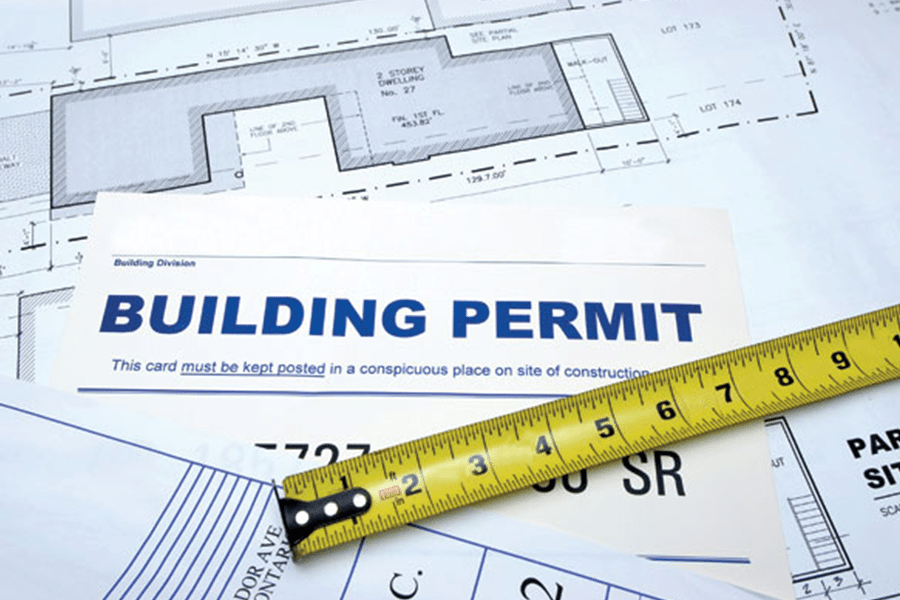Zoning legislation, also called zoning ordinances, define 1) what kinds of land usage is permitted a given place and 2) construction regulations like maximum building size or the demand for fire escapes. If you are starting a business, you need to be knowledgeable about the zoning laws which cover your building and area.
Here are a Few of the most common municipal and national zoning laws:
- Commercial versus residential versus manufacturing
- Type of commercial venture allowed, e.g. retail or manufacturing or restaurant
- Health and security regulations like use of poisonous chemicals or access to fire extinguisher
- Parking demands
- Setback requirements
- Signage
- Types of buildings which could occupy an area
- Size of buildings and internal demands like multiple exits
- Floor to area ratios (FAR), e.g. you must allow for walking space, etc..
- That decent lighting, atmosphere, and open space is provided
- Accessibility, e.g. Americans with Disabilities Act
The top 4 things you should understand regarding zoning legislation include:
- What Zone Your Construction Is In
- Whether Your Business Is Launched In This Zone
- Which Are the Building Requirements
- Which Will Be the Signage Requirement
Do you need more information on zoning laws and other legal inquiries? LawTrades provides help to get your business up and running and keep it in good standing with ongoing compliance support. Click Here to get a one-month free trial.
Visit LawTrades
#1 — What Zone Your Construction Is In
The very first step in knowing how zoning and construction codes will affect your small business. Find the GIS mapping system of the right jurisdiction for your own county. Many cities and counties are providing these online today, and all you have to do is find the right maps and layers. You can often do so by studying”zoning for your county title” in Google. Find the piece of land or property you’re interested in and see what the zoning designation is.
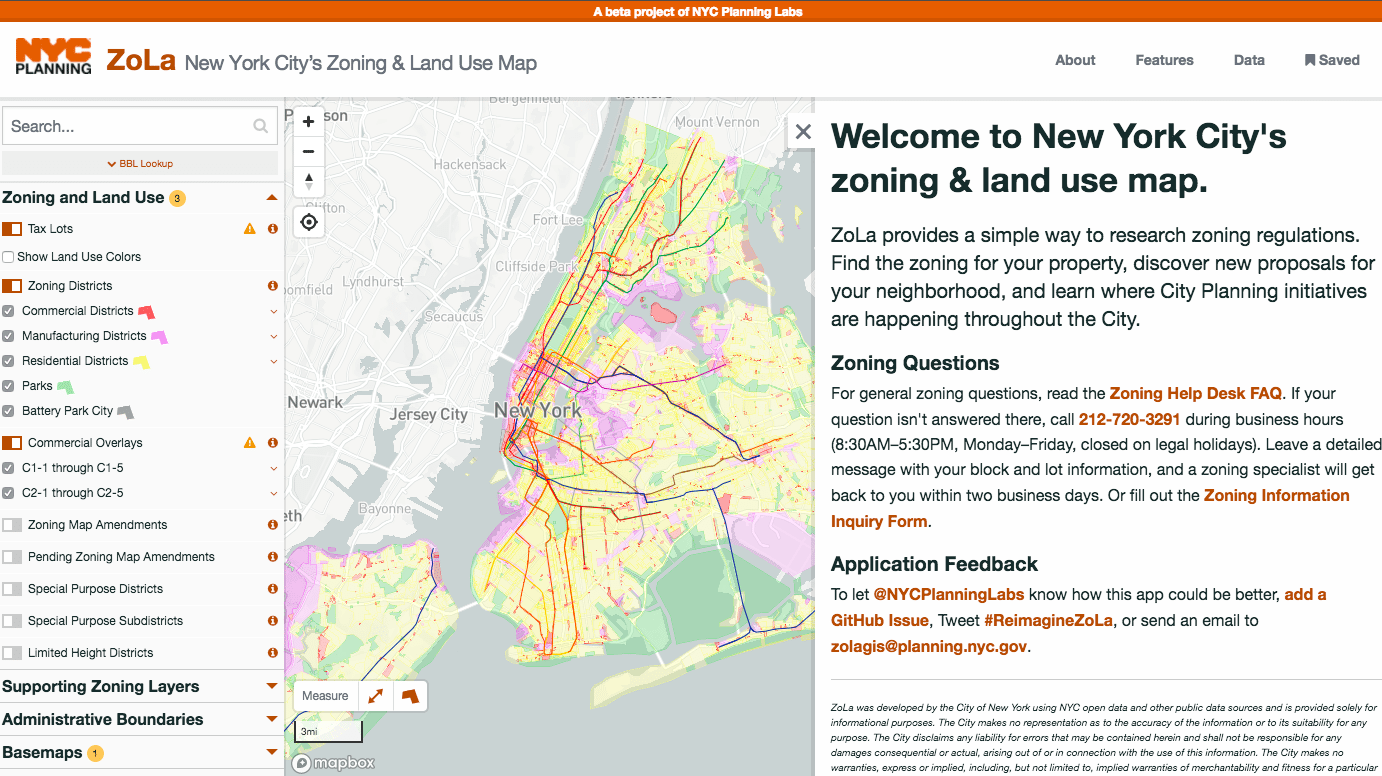
New York City’s Zoning & Land Use Map
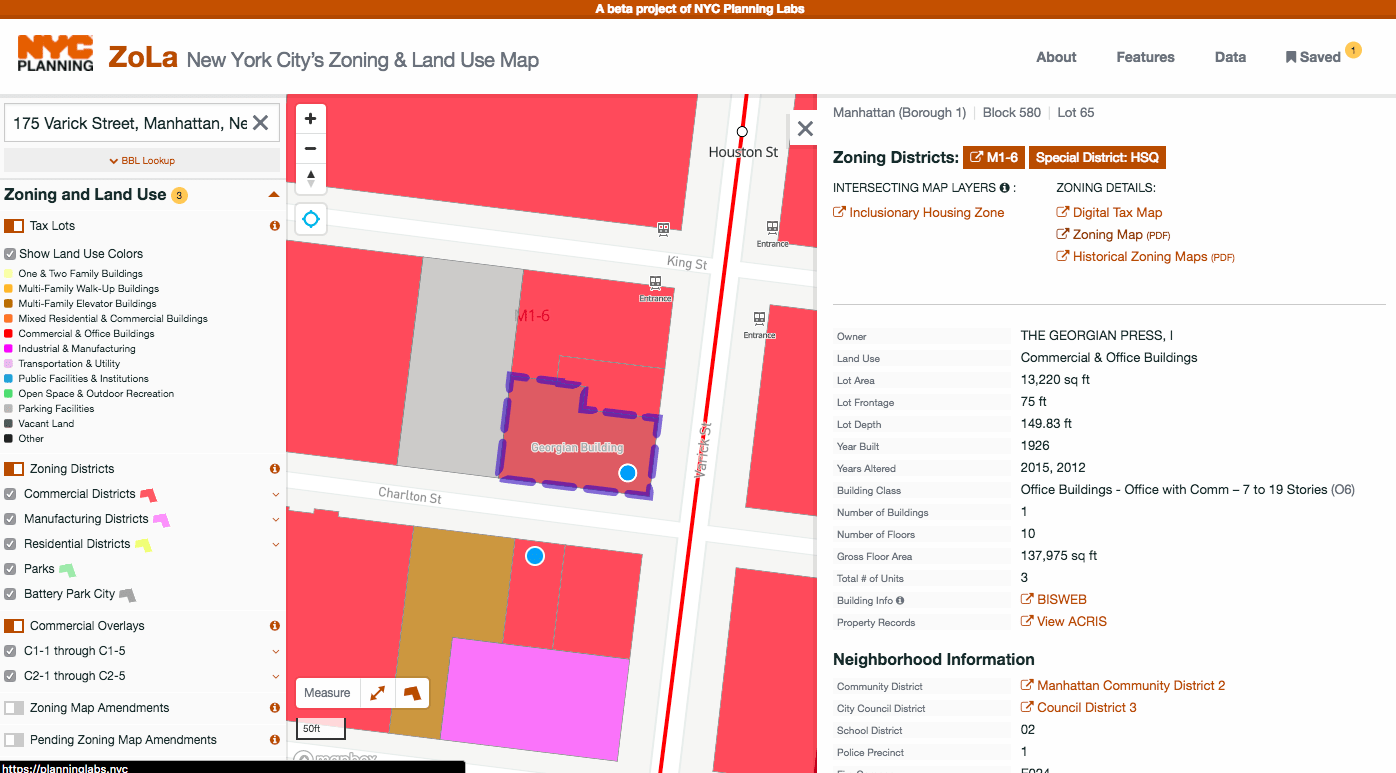
Report for a construction in Manhattan
Here’s a quick cheat sheet:
| Zone | What Does It Mean | Notes |
|---|---|---|
| Residential | Need to apply for a House Occupation permit, or anything similar. To run company from home. No business buildings are permitted. | You can run many kinds of business from your home however there usually limitations. For instance in New York City there is a limit on how big the company area of a house and particular businesses like public relations or beauty parlors are not permitted. |
| Commercial | Allowed to erect buildings for business and conduct business operations. | Frequently there are subtypes of commercial zones such as office building or retail. |
| Industrial | Can erect buildings for certain businesses and conduct business operations with higher noise levels and squander. | There are often subtypes of industrial such as light manufacturing or chemical intensive. There are normally strict safety and environment codes partners with these zones. |
| Agricultural | Ordinarily, for farming. Restricts non-agricultural usage and development. | |
| Historical | Mostly homes or building districts over 50 years old. Permit companies, but need to maintain buildings as intact as possible and just certain adjustments and renovations can be made. | |
| Cosmetic | Most notable in cities. Allows a few businesses, but requires buildings and companies to comply by specific colour schemes, landscaping needs, building restrictions (decks, etc), and more. |
Sometimes, a property might have multiple designations, like Residential-Commercial or even Commercial-Residential, also known as zoning overlap, which allow owners or occupiers of the chance to utilize it in either way.
#2 — Whether Your Own Business Is Launched In This Zone
If you have figured out what zone you’re in, congratulations, you just completed the easiest aspect of this procedure. Now it gets hard. Most zoning regulations have evolved over a great deal of time through very specific legislation targeting specific town businesses. So most areas have quite complicated regulations. Merely to make it harder most municipalities have adopted their own shorthand for seeing a variety of allowances and restrictions. You have to cross reference zones with allowance categories and then check on any particular variance to this unit or place.
The first step would be to map your zone to allowed uses. For instance in New York you find the Zoning District for your zone. You then look up the uses allowed for that subject. 
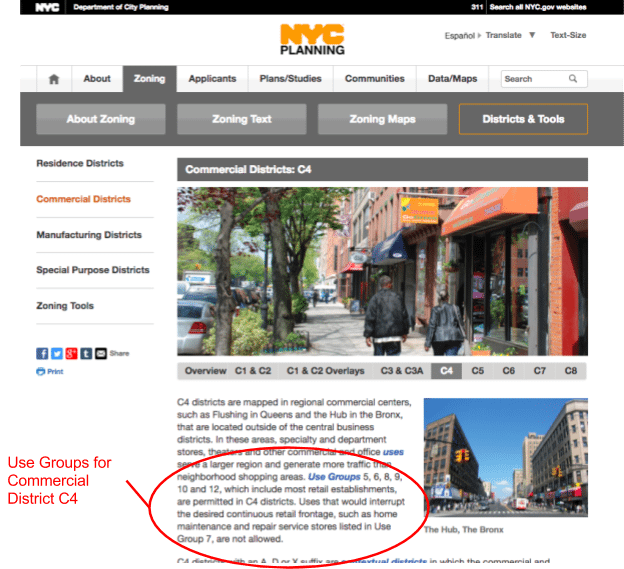
Use Groups are located in the district definition
You then look up the Use Group definition. Here’s an example of”Use Groups” in NYC. It is buried in a Zoning Resolution.
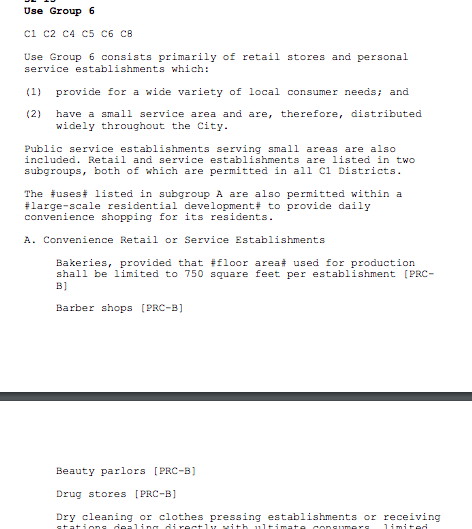
Example of Mapping Zoning Laws to Allowed Businesses
Along with the base classification there could be special designations allowing or disallowing specific uses.
Sometimes, searching on the internet isn’t sufficient. You might need to pay a visit to the county recorder’s office to look at the covenants for a neighborhood or lot.
#3 — What the Construction Prerequisites Are
Whether you’re constructing a new building or changing an existing building you need to know the construction requirements to your zone. For instance zoning laws might dictate a particular Floor Area Ratio (FAR) that is the highest amount of building square footage for a given lot size.
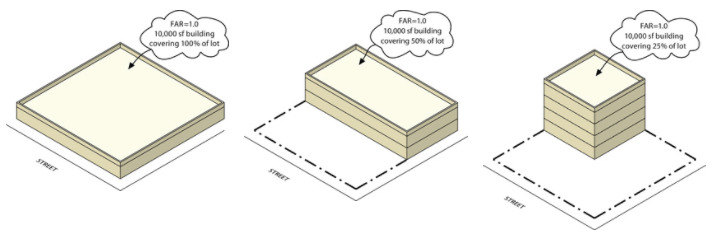
Floor Area Ratio Calculation
Building zoning laws cover areas such as parking, walkways — external and internal, required setbacks or distance from the street, and number of rooms allowed.
Construction Codes
In addition to building size other building requirements covered by zoning legislation there are number of building requirements insured by local building codes. These include:
- Construction administration, e.g. licensing, maintenance, etc..
- Pipes codes, e.g. fittings, water heaters, sanitary drainage, storm drainage, water piping systems, etc..
- Mechanical codes, e.g. venting, water and boiler heaters, solar systems, etc..
- Fuel gasoline codes, e.g. gas piping, chimneys, appliances, etc..
- General construction code, e.g. interior finishes, fire protection, exits, construction materials, etc..
Americans With Disabilities Act
Besides zoning ordinances and building codes, all new building in buildings must conform to the Americans with Disabilities Act (ADA). This Federal law generally covers:
- Available entrances
- Available routes
- Accessible restrooms
- Available telephones
- Accessible drinking fountains
- Accessible parking, storage, and alarms
Examine the jurisdiction’s permit database to find out whether any structure has been completed in your space since 1990, once the ADA moved in impact. If not, your landlord may be responsible for bringing up the space to code.

Applicable ADA standards based on date of construction
Permits Required
If your building or altering a building there is likely to be a slew of licenses you need to acquire. This procedure may also include a chance for those in the area to challenge your building plans. If there are any permits in procedure or approved before you acquired the property but have not built yet you might be asked to finish those projects as well.
Restrictive Covenants
In addition to some municipal regulations you may be subject to land developer restrictive covenants. This is especially true for properties that are leased. The developer of the property may have restrictions on what you could do including signage, aesthetics, parking, etc..
In general while it’s a good idea to know what’s from the zoning and construction codes your very best choice is to work with a certified contractor who is familiar with construction regulations and necessary permits for your zone.
#4 — Exactly what the Signage Ordinances Are
Most counties and cities have separate sign ordinances written into the zoning code you have to comply with, even when you are in a commercial zone. If you are thinking about space in a historic office building, the contemporary indication that you have designed for your brand may not be allowed. Sign companies consult these codes when applying for permits, but you should too before signing leases or purchase agreements. Check with your county recorder and zoning committee for additional information.
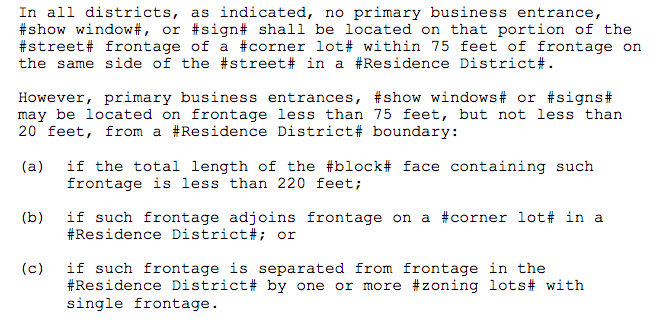
NYC Signage Rules for Commercial Corner-Lot Properties
When You Can Not Find the Answers
If you’ve combed through all of the databases and still aren’t certain what you can or can’t do, it is time to create a phone call or have a visit to a professional office. Most planning and zoning offices have analysts accessible during business hours to answer questions about permit applications. Some authorities will also have listing centers accessible, where a tech can answer questions and even do the research for you. Never hesitate to ask a question. Not asking questions upfront will cause more headaches, wasted time, and unnecessary spending down the road.
But if in doubt get expert assistance. For more information on hiring a general contractor check out our post on it.
Bottom Line: Does Your research or Hire a Professional
Before you consider moving your business into a commercial property or performing construction on your house be sure to realize the building and zoning ordinances associated with your property and business. Or get professional help. Ensure you know:
- How your land is currently zoned
- What businesses are allowed
- What the construction requirements are
- What the signage restrictions are
You’d hate to get far into your preparation or perhaps start a move or structure simply to learn that your out of compliance and all that work was for naught.
Don’t forget to check out LawTrades if you want help understanding zoning legislation and for additional business legal needs. They will give you a committed attorney to fulfill your needs. Plans begin at $50 a month. Get started with a one month free trial.
See LawTrades

